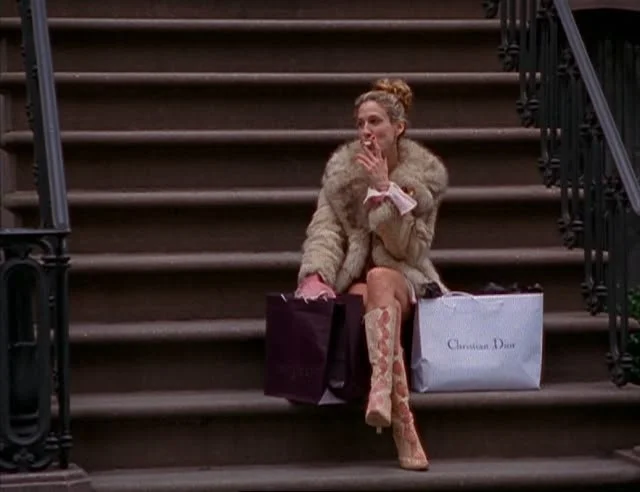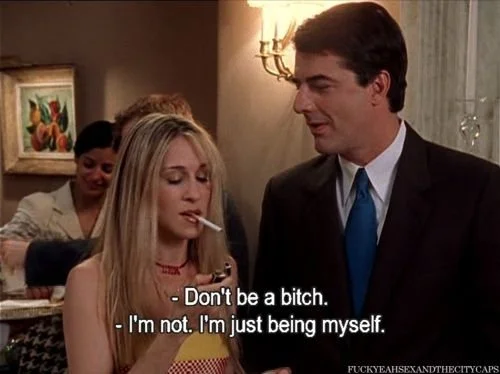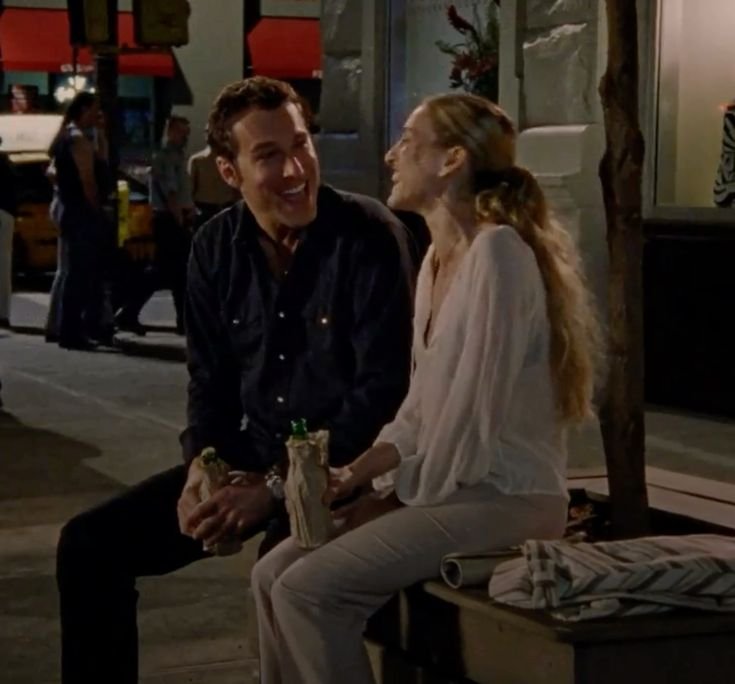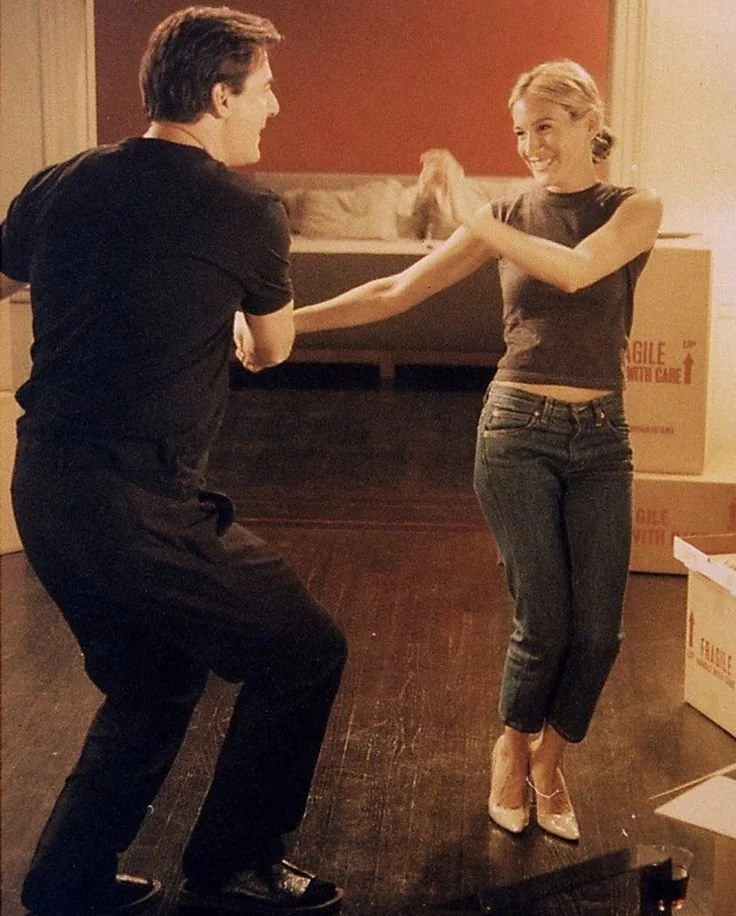You’ll Hate Her Until You Are Her: The Carrie Bradshaw Paradox
From rent-controlled chaos to couture epiphanies, the Sex and the City heroine remains polarizing for all the wrong (and right) reasons.
By Natalie McCarty
For the late ’90s and early 2000s, the complicated woman came wrapped in sequins and mismatched animal prints, hailing yellow cabs with two different soles of Manolo Blahniks clicking against cracked sidewalks, and curling up with a flickering laptop at two in the morning. Carrie Bradshaw, Sex and the City’s chain-smoking, column-writing heroine, was never built to be a role model or a flawless romantic lead. Yet for over two decades, we’ve demanded that she behave like a saint.
Carrie is one of the most polarizing figures on television, and that friction comes from a place of painful recognition. More than just a character on screen, she’s been embedded in pop culture for years. A touchstone, a cultural reference, an icon, she’s a mirror tilted in just the right way to show us the parts of ourselves we’d rather not examine. She’s the girl you once were at seventeen, heart swollen with ambition and naïve hope. The woman you became at twenty-three, caught between desperate independence and creeping self-doubt. And now, in And Just Like That…, she’s the woman at fifty-five, carrying the weight of her past choices and still trying to make sense of them.
Image Courtesy of HBO’s Sex and the City
She infuriates us because her flaws are ones we know too well. The emotional recklessness that turns into a cycle of self-destruction. The week-long shoe splurges that could have covered four months of rent, yet somehow feel justified once paired with one of her inventive, oh-so-very-Carrie outfits. The way she keeps circling back to men who broke her heart, not because she enjoys the pain, but because she still believes—against all reason—that the ending might be different this time. She is a woman who keeps looking for love, even when she knows exactly what it will cost her.
In your twenties, when you still believe life should be neat and love should be rational, that things will fit and you’ll just magically find “the one,” it’s easy to dismiss her. She dismantles every tidy ideal we cling to and replaces them with stories that sprawl, and decisions that make no sense on paper. Weird dates, situations you feel you’d never be caught dead in.
The world wants you to see Carrie Bradshaw as a cautionary tale. We’re taught to praise women who move through life with a plan and a safety net, who are married and have a family by twenty-five. Carrie has neither. Society warns that the worst fate for you is to end up like Carrie Bradshaw: still single or returning to that man.
But the truth is, you already are her. Or at the very least, you’ve been her once. And if you haven’t, I’m telling you… it’s coming.
One day, you find yourself in the middle of your own mess, most likely tangled in a relationship that’s clearly wrong, or sitting through some overpriced brunch with your closest friends, and suddenly, she makes sense. You’ll have the sobering realization that you’ve just droned on in conversation with the same rhythm and cadence as our favorite problematic fashionista with a sex column.
Image Courtesy of HBO’s Sex and the City
Personally, I’ve always respected Carrie. Identified with her extremely when I lived in New York. Admired the freedom she’s carved out for herself. The reckless abandon for love, the way she holds her friends close and lets her stories fly free. Since the ’90s, she’s been setting women free with her portrayal of what womanhood, identity, friendship, and romance can also mean.
You are Carrie Bradshaw when you realize that staying in something bad can feel easier than being alone. That passion sometimes replaces comfort, art sometimes replaces stability, and neither lasts forever. You learn that independence can be its own kind of exile. And Carrie, honestly, teaches you that.
That’s when she stops being a cautionary tale and becomes a companion. A sister. You hear her voice when you’re sitting through a bad date, when friends bail on your birthday dinner at Il Cantinori, or when you catch your reflection layering clothes that make no logical sense but somehow feel right (I see you, girl!). Her column stops feeling like a relic of a bygone New York and starts reading like a guidebook to the life you’re living now.
Image Courtesy of HBO’s Sex and the City
She goes back to Big because love is rarely clean or kind. She screws over Aiden because she doesn’t know how to accept a good thing when it’s right in front of her. Comfortable, stable, what is that, really, when you can have that addictive chase? Big is so good that it’s bad, like a cigarette you know you shouldn’t have. But you do anyway.
Love is often like this: a tangle of mistakes, longing, hope, and sometimes sheer survival. Pity, hatred, courage, doubt, desire: love can make a fool of you. It can make you wear a top hat and show up at a man’s door with McDonald’s in hand, speaking French. Carrie Bradshaw does these things. I have too, in my way.
Image Courtesy of HBO’s Sex and the City
Before TikTok turned heartbreak and breakups into calculated algorithmic content, and love into a currency, Carrie was writing her own experiences in eight hundred words a week. No filter, just the candid truth of a life fully lived. Of a carpe diem’ed. Her stumbles made it easier for us to look at our own. Her heartbreaks felt like they belonged to all of us.
She could lose her bodega-bought nameplate at the fanciest stores in Paris and somehow turn it into a launching pad for something romantic. She could be dumped via a Post-it note and still make it feel like a cultural moment. She could confess her feelings with such blunt, reckless honesty that you found yourself forgiving everything that came after.
Image Courtesy of HBO’s Sex and the City
Carrie Bradshaw embodies the feminism of the late ’90s with the glittering promise of “having it all” tangled with the quiet ache of loneliness, independence forever shadowed by the longing for connection. She is a beautiful contradiction, defying every attempt to be reduced or simplified.
Her flaws are what make her so special. They’re the messy dialect of someone trying to be seen, to be loved, to be whole. She’s not an icon to worship or a villain to blame. She’s the vivid, complicated humanity that lives in all of us.
And just like that, you’ll hate Carrie Bradshaw until you are her. Until you’re standing in your own cramped apartment at midnight, telling a friend about a man who didn’t love you back, and realizing you’re already writing the headline.





